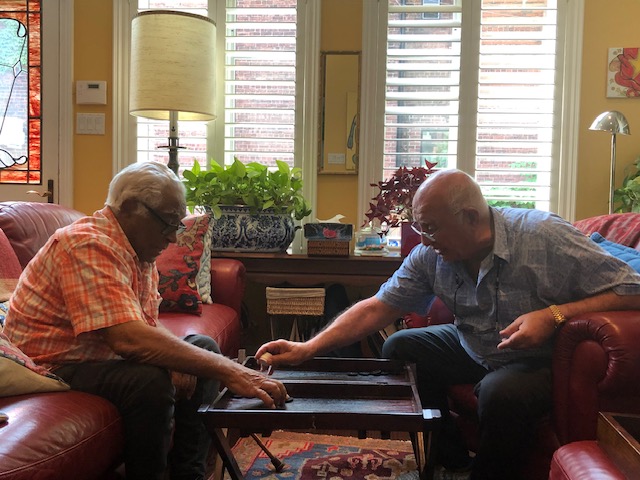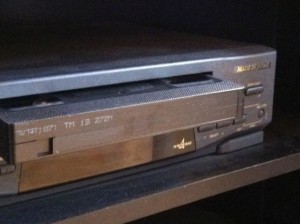Posts Tagged ‘Toronto’
Remembering Uncle P. – A Tribute
I don’t know how to do it.
I don’t know how to understand a world that no longer has Uncle Pethro in it.
It’s not that I’m overwhelmed with grief at his passing. Losing my mother eight years ago shifted my perspective on death and dying. So, I am sad, I am heartbroken, I am bereft, but I am not in pieces.
Still, the journey of saying a final goodbye to someone who has been a constant fixture in my life is difficult. Coming to terms with the impact his loss has on others is even more fraught with emotions.
The formal obituary tells the story of Uncle Pethro’s life and outlines the legacies of his accomplishments, achievements, and successes. It pays tribute to his extended and extensive family and honours the woman who stood by his side over six decades, matching him stride for stride over the years, my Aunt Madge.
But who was this man to me?

My mother’s first cousin and one of her best friends. Uncle Pethro and my mom shared a bond that helped each of them triumph over the reality of being outsiders. Others consigned them to the margins. They asserted their right to be at and in the centre. They made sure they were seen, heard, and recognized without compromising what they stood for and who they wanted to be. They did not accept the spaces others relegated them to and forged their own paths, carved out more imaginative lives, lived bigger stories than the ones others wrote for them.
Uncle Pethro was the man who would say, “Let me look at you!” even if you were standing right in front of him. He didn’t just want to see the face you presented to the world, he wanted to see the essence of who you were on the inside.
He was also the man with the all-consuming embrace. The man whose arms would wrap around you and make you feel protected, invincible, and treasured.
He was the man whose voice echoed in the room, whose voice was deep, resonant, and full. And — I say this with love — it’s a voice you heard often and at length because he loved to pontificate! He wanted to dig out the complexities of life, to talk about its nuances, to sort out its chaotic randomness at the same time that he could be rude, crude, and indelicate.
He was the man who had a pride of place. He loved Jamaica, the land of his birth, in all its contradictions, even if it was the home he had to leave to find the space to be free and to become the man he wanted to be.
He was generous, caring, and thoughtful, opening his doors, at home and at work, to a diversity of folk. He and Aunt Madge entertained well and often, and they set a standard as hosts that is difficult to achieve, and essential to emulate.
We all forgave Uncle Pethro his bombastic nature because underneath it all beat a passionate, life-full, and cheery heart.
Until it didn’t.
Ultimately, it was Uncle Pethro’s body that stopped working with him and started to work against him, that whittled away at him.
He was stalwart throughout each health crisis that battered him. His physical strength and mental toughness, along with Aunt Madge’s love, diligence, and care, carried him further and for longer than seemed possible.
When I moved to Toronto in 1986, Uncle Pethro and Aunt Madge welcomed me into their home and made sure I never felt alone in the vastness of the city or lost in the gulf of the choice I had made when I left home.
They saw me through the ups and downs of my time in that city, celebrated with me when things went well and consoled me when they did not. We shared food, drink, and conversation. We built a bond that transcended the familial connection. That feeling of being a part of each other’s lives became even stronger after I returned to Vancouver and our visits, because of the distance, became occasional rather than frequent.
Having spent the last few days in Toronto with Aunt Madge and the family, I’ve been reflecting on the past and ruminating on the future. Now I’m sitting here in seat 2B on Porter Air, Flight 309, surrounded by strangers, high above the clouds, and anxious to get home. I’m trying to make the pictures in my mind, of the vibrant, vital person I knew and loved, more animated and I’m fighting the way I feel that they are blurring and ebbing already. I’m trying to understand this new world that has lost that singular gravelly voice, that strong embrace, that hearty appetite, that appreciation for beauty, and that gift of laughter.
It’s not about making a saint out of my Uncle Pethro or remembering him as a paragon of virtue. It’s about knowing to love him as the man that he was.
Because if there’s anything I’ve learned from the years of being in Uncle Pethro’s company, is that to be human is divine even if we are flawed and our lives are finite.
To understand this world without Uncle Pethro is to understand that it was better with him in it, and that it will still be good because he was once a part of my mornings and my days, my nights, my years, my joys and my sorrows.
I will remember him.
Rest in peace Uncle Pethro.
Walk good.
Rafting Life’s River of Regrets and Resolutions
“Non! Rien de rien … Non, Je ne regrette rien.”
With these words, Edith Piaf sings and proclaims a life of no regrets for the good and bad times she’s had, for her ups and downs, her sorrows and pleasures. It’s a powerful anthem, but the binary of no regrets versus regret is too stark a contrast for the reality of complex lives and complicated life journeys.
Similarly, the boastful, defiant, and defensive posturing of Paul Anka’s “Regrets, I’ve had a few. But then again, too few to mention” is also unsatisfying. The insistence that “I did it my way” elides any notion of factors that are beyond our control and circumstances that constrain our ability to act.
In terms of my own life, regrets for opportunities that didn’t come together or that I let elude my grasp haunt me.
If I had been accepted into the MA programme in History at UBC or if my application to law school had been successful in the early 1980s, I would have likely built a multi-decade career by now in either academia or law. Of course, I have found my way back to academia and am a better scholar today than I would have been as a 22-year-old, but it is difficult balancing the reality of being a mature woman with that of being a junior scholar.

I resigned my position with Expo 86 before the fair opened. I was an early hire and one of the original hostesses that welcomed guests to the display pavilion before moving over to the Expo Centre, better known today as Vancouver’s Science World. If I had persevered and accepted the boredom and circumscribed responsibility of my role at that time for the benefit of experiencing the world’s fair as an insider, would I have established a network that allowed me to work at other events around the world? On the other hand, I’ve been fortunate enough to travel to different countries without the obligation of working while away.
Before returning to Vancouver from Toronto in 1992, I tried to secure a position with Rogers Cablesystems, my employer at the time, but they didn’t come through with an offer until after I’d made another commitment. What would have happened if they had made the offer sooner and I had been a part of Rogers’s pay-per-view initiative? What if I had listened to Jerry Beckerman, a family friend and well-connected political strategist, and sought the nomination for a nearby riding when the incumbent MLA decided not to run for re-election? What if I had been more diligent in pitching stories when I was writing food and travel articles, with pieces appearing in the North Shore Outlook, The Georgia Straight, and other publications? What if I had followed up with the editor from Gourmet who gave me his card when I attended a weekend of culinary workshops and events in New York, which the magazine had organized?
This process of self-reflection is necessary, ongoing, and can’t merely be an end-of-days reckoning. In Oedipus Rex, Sophocles writes, “Now as we keep our watch and wait the final day, count no man happy till he dies, free of pain at last.” While crossing that final frontier may mean an end to pain, if we can’t find comfort and happiness until we die, then life is an empty, joyless exercise. Sophocles reflected the mentality of his era, one in which society viewed humans as playthings of the gods. Many today entertain similar notions of fate. However, to believe that life is a matter of God’s will is to embrace the simplicity of an answer rather than the complexity of a quest.
As I see it, the resolution of my life’s trajectories brings me to this point, this present, this now. It seems to me that taking the measure of one’s life, regrets and all, is about the ability to say “okay, I’m good here and I will continue to strive.” It is an eternal balance between letting go and holding on because to have no regrets is a life without learning and to wallow in regrets is a life without purpose.
The current Covid19 global pandemic has tugged us further into living in and for the moment. It also shines a glaring spotlight on systemic injustices and inequities that allow people with privilege to stay home rather than negotiating the frontlines and trenches of in-person work. This reinforces my belief that the greatest privilege is the privilege of mobility, the ability to move between spheres of existence whether physical, emotional, social, geographical, intellectual, or economic. That’s why boxing people into hierarchical slots and labelling them as this or that is an act of oppression. It denies individuals the right to move across boundaries and between spaces, in a material as well as a metaphorical sense, perpetuating existing power structures and historical patterns of domination.
While it is easy for me to opine about the life I’ve lived, in a blog post of over 1,000 words, it also projects a certainty and confidence I don’t feel. Rather, take this writing as evidence of what we all have to do. We all have to sit with the unease and discomfort of a future we don’t control and a past we can’t forget.
For me, in this moment and stage of life, I know I am more comfortable with myself, if not at ease. I have come to terms with who I am and what I have done although I am continually questioning my understandings. I’m still sorting out where I want to go from here, why and how. I recognize that there are decisions and commitments that I will have to make although many factors are beyond my control. I also know that I have to continue to be aware and reflective, to strive and to move. I can never ever get so submerged into myself that I fail to recognize my privilege, forget to be grateful for all I have, and make the mistake of thinking my experience stands in for everyone else’s.
The actions I take may not change the world or shape current events, but I need to do what I can — we all need to do what we can — to make things better for ourselves, our friends, our families, our communities, and our world. It’s about the stake we have in lifting up humanity as a collective. The loss of that collective vision or limiting our collective vision to those who look like us and live like us, is the greatest threat to our future. As we survey the regrets and resolutions of our lives, as we raft the rapids of our existence, it is our obligation and responsibility to ensure others can do so, too, safely, with dignity, integrity, and the knowledge that they are valued and valuable.
Friends, Movies, and Memories
I had lunch with friends recently. Our conversation turned to favourite movies and I mentioned Truly, Madly, Deeply starring Juliet Stevenson and Alan Rickman. I also said how tough it was to track down a copy to play at home. The DVD had been discontinued and anything I’d found online was expensive.
Later that day I received an email from my friend: she’d ordered a copy of the movie for me. She didn’t realize it at the time, but the copy she’d tracked down was reasonably priced because it was a VHS tape. Not a problem: I have a working VCR at home.
I first saw Truly, Madly, Deeply when I lived in Toronto (1986-1992). There were any number of cinemas within walking distance of where I lived and a quick subway ride could get me to movie theatres on St. Clair or further north along the Yonge Street corridor.
I went to the movies often during this time and often alone.
Why?

Because when you live on your own, you learn to take yourself out. You can’t always count on having someone there to go with you, whether to a movie or for dinner or to special events. It’s tough to do, especially as a woman, but it’s key to surviving the isolation and loneliness of city life.
I remember enjoying many new releases in Toronto including Disney’s Beauty and the Beast. I was much older than the target demographic but was enticed by the reviews which described Belle as a new-style Disney heroine. She reads!
I saw Thelma and Louise in Toronto although I’m not sure the stranger who sat beside me understood the film given how his hand drifted over during the screening to fondle my thigh.
There were also movies I enjoyed with friends or with visiting family members. Dirty Dancing, Dances with Wolves, Terminator 2 (at the time, the most expensive movie ever made). I also remember going to see Silence of the Lambs (it made me nauseous) and The Princess Bride which had me laughing as much as I’d ever laughed.
Those memories may not be as vivid as they once were, but the stories, the images, the feelings, the impact of that time and those movies have stayed with me.
So as I anticipate the click of the VHS tape in the machine and the whirl of the spools as the tape begins to play, I’m also a little nervous. Will the movie live up to my remembrance of it? Will it move me in the same way as before? Will I go through piles of tissues the way I did when I first saw it?
At the end of the day, it doesn’t matter. I’ll enjoy the film, but the memory I’ll latch on to is that of a friend who went out of her way to help me recapture the magic of a darkened theatre and a brilliantly acted story of love, grief, healing, and life.
Thank you A.E.!
An excerpt from La Muerta (The Dead Woman), a poem by Pablo Neruda, which is recited in Truly, Madly, Deeply
No, forgive me.
If you no longer live,
if you, beloved, my love,
if you have died,
all the leaves will fall in my breast,
it will rain on my soul night and day,
the snow will burn my heart,
I shall walk with frost and fire and death and snow,
my feet will want to walk to where you are sleeping, but
I shall stay alive …